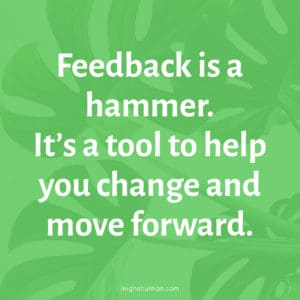“Every writer needs a reader,” my college writing mentor Nancy Piore said. Day after day, she drilled into us the importance of giving feedback on each other’s work. Even those of us who loved her class grumbled when we had to hand over our precious unedited words for feedback.
People pay thousands of dollars for feedback on their writing, especially for books, and yet we so often ignore the feedback we’re given. Why? It may come down to a simple fight or flight response. When you hear you’ve done something wrong, your body clenches and resists.
Nancy taught me the value of getting readers’ responses to my work. She also taught me why it’s so important to give feedback to others in order to improve my own work. Creative work expands with the right feedback. When an impartial reader points out what’s not working, they offer a road to growth. You can’t see your own work with the same clear eyes as a reader can. Without feedback, your work stays in your head. You cut off an opportunity to improve

This is how I learned the power of giving feedback
What I learned in Nancy’s class endures. I implement techniques I learned in her class in my own teaching and book editing. When people join me for a Creative Revolution Writing Retreat, we spend a whole day focusing on how to give and receive feedback on writing. Then we incorporate editing and giving feedback as part of the writing process for the rest of the retreat.
My retreats are an inspiring and supportive environment that makes you want to create. This happens because of the people who join me. Some arrive with pages already written. Some not. Some people have experience writing. Others, none. The common denominator between all of the participants is a willingness to share their writing and an underlying desire to help others. Together we create a vision of what’s possible with our writing.
Even so, the same wonderful people at my retreats complain when it’s time to give and get feedback on their writing.
I don’t know how to give feedback.
What good is feedback from someone who isn’t an experienced editor?
I prefer working on my own.
I don’t trust others to see my work.
These are only some of the reasons I hear.
I get it.
It sucks to hear your work isn’t perfect.
Feedback isn’t fun. You’re forced to look at yourself head-on. You pull apart your story and look at the pieces. This work requires you to mute your ego on mute and listen to what someone else believes about your creative work.
Adding to your discomfort, most people don’t have a natural ability to offer constructive criticism. Think back to school or your first job—or any job you’ve had since. How often do you dedicate time learning how to give and get honest and constructive criticism? How often do you listen to another person’s ideas about your work? It’s generally not something we’re taught to do.
Here’s the secret to giving feedback.
Feedback isn’t about what others give you. It’s about learning to read other people’s work. When you give feedback to others, you improve your own writing
How can you improve your own writing by giving feedback?
Giving feedback to others requires you to be an outside observer. When you give feedback to others, you take a step back. It’s not your work under scrutiny, so you can see it without being attached to the writing. You shut down your inner editor and turn your naked observations into questions that help the author see their writing from a different perspective.
The more you develop this skill—giving feedback to other people—the easier it is to see your writing dispassionately and find ways to strengthen it. The more you practice this skill on others, the easier it is to turn that observer’s eye on your own work.
Accepting feedback asks you to bypass your ego. You have to let go of the idea of your work as good or bad. Those are quality judgments that don’t apply to our creative efforts. Whether or not someone likes or doesn’t like your work is a matter of taste and opinion. Even the most glowing positive comment on your work does nothing for you if it doesn’t create a way for you to improve or see how your work impacts your audience. When you approach feedback with this mindset, even the worst most painful feedback can be an opportunity to improve and move forward if you so choose.

How I let go of my ego to hear the meanest feedback ever.
Let me tell you about the worst feedback anyone has ever given me. I took a novel-writing workshop in graduate school. Each week, we’d read one person’s novel in progress and offer feedback. When it was my novel’s turn, I dutifully handed out printed copies of the pages I’d worked on so lovingly. It was a rough draft, I knew, but surely the story I wanted to tell was there. I arrived at class on the day of my critique, nervous because I wanted them to love my beautiful text. I didn’t want to hear anything bad about my writing.
John responded first. He was a tenth-grade literature teacher, very well-read, and someone who professed to want to write the next Harry Potter. He looked me straight in the eye and said, “Most readers never read past the first fifty pages of a book, and I couldn’t get through the first five pages. This is crap.”
You’d figure since he only read the first few pages, that would be it. But no. He had more to say. “I can’t imagine anyone will ever actually want to read this book.”
The room went dead quiet. Was it a fair critique? It certainly wasn’t very diplomatic or kind. To make matters worse, I had an audience of ten, including a professor I adored, watching my response.
Here’s the funny thing. All these years later, I don’t remember my response nor do I remember feeling upset by what John said. Though I imagine I was embarrassed, angry, and had a powerful urge to defend myself and my writing. How dare he talk about my writing that way?
All these years later, two lessons float to the surface.
1: John wasn’t writing something I particularly wanted to read either. His vision for his writing included writing a bestseller that would bring him buckets of money and fame. My vision for my writing took me elsewhere. My book told the story of a young couple who get married. I wanted to explore the complicated nature of family relationships during tragedy and crisis. His opinion about my book didn’t really apply to the work I was doing. That he delivered his feedback in such an inappropriate and unnecessary way was another reason to overlook what he said.
And two: After taking time to cool down, I wondered if perhaps there was something about my writing that made it hard to read. After all, others in the class said similar things, albeit they were far more diplomatic in their delivery methods. about why a reader would have a hard time with my writing. On rereading the book, I saw how my writing wasn’t accessible enough for other people to understand. I needed more explanation, more description, more examples. And I could have done with fewer forays into the fragmented, unintelligible inner lives of my characters.
John’s critique showed me what I needed to do next. No one would read my work if I didn’t add narrative, dialogue, and remove the creative punctuation and diction of which I was so fond.
Did he have to be so biting and unkind? Absolutely not. I’d never speak like that about another person’s writing. It’s destructive. I’ve worked with people who received similar feedback, and it stopped them from writing for years.
Even hurtful feedback can help
I begin everything I write with free-writing or journaling. I sit down and let everything pour from my brain onto paper. That’s how I wrote the book I brought to class, and it was a series of endless bouts of freewriting. God bless anyone who has had to tackle my early drafts. John, that jerk, taught me the importance of going back to edit one more time before handing my writing to readers. He showed me how important it is to connect the dots so readers can follow the thread of my story.
Sure, John could have chosen a kinder way to express himself, but that’s not what happened. He gave me what he gave me, and here I sit 20 years later, the sting of his words long gone, but the lessons I learned about writing prevail.

Feedback is a hammer. It’s a tool to help you change and move forward. You can take advantage of feedback by approaching it without judgment. Yes, it’s hard to do that when someone tells you what you’ve created is crap. Do it anyway.
Is this working? Will my reader understand what I’m trying to say? Am I getting my point across? These are the questions to ask of your writing. If you answer “yes” to these questions, great. Keep going. If not, then you have an opportunity to change it.
When you learn to view feedback through that lens, you’ll see that feedback isn’t about you. It’s not a wholesale attack on your worth or future self. While it’s natural to feel defensive and any other number of negative emotions on hearing feedback, look past your gut reaction to see the nature of the feedback.
Some questions to ease the pain of feedback
Is the person giving feedback the right fit for your work?
I hate blood and gore. The last thing I want is to be anxious and afraid, so when a potential client asked me to read her violent novel, I had to decline. I’m not the right reader for a grisly horror novel. The feedback I’d give would be influenced by my dislike of the genre and won’t be as useful as feedback from someone who loves horror and knows the genre well. But ask me to read romance, sci-fi, or just about any other genre, and I won’t have the same bias.
What kind of response are you expecting when you ask for feedback?
When you ask for feedback, it’s important to know what kind will help you most. What are you looking to accomplish? Do you want deeply detailed criticism to take an almost complete project to the next step? Or are you hoping for something that encourages you by pointing out your strengths?
People give me their writing at all stages of the writing process. Some give me pages of free writing with very little structure. Others give me finished drafts of short stories or books. Others give me their book after publication. I respond to each type of writing in completely different ways.
Early freewriting isn’t intended to have much structure. It may not even have a clear message yet. When I read this writing, I look for patterns in the language that help me the overall message. I ask the author l questions to see if what I understand corresponds with what they want for the book.
By contrast, a draft of a work-in-progress will benefit from feedback that helps shape the structure and ideas already in the book. When I read drafts, I trace themes over the course of the book and make sure the message is clear.
How feedback helps you improve your work?
Does the feedback you receive help you fill in blanks in your plot? Does it show you where your characters need to go deeper or where your dialogue isn’t working? If not, then you discard it and move on with your life. Why waste time wallowing in something that has nothing to offer you? You have every right to say no to feedback that doesn’t work for you.
But if it helps you improve? Even the shittiest most ad hominem attack can be useful if you can allow it to help you. Then you can choose to take what serves you and throw out the rest.
You can also choose who sees your writing and only give it to people you trust to read well and show you what works and what doesn’t so you and your writing can thrive.
This is what I teach others to do in my writing retreats. This is what I do when someone hires me to give developmental edits on their writing. This is how I approach my own writing. And this is how I know it will work for you, too.

